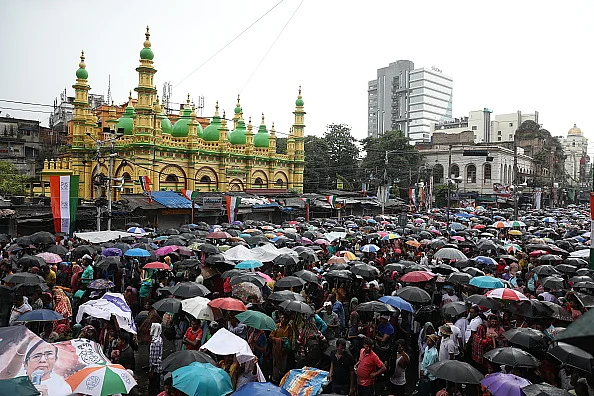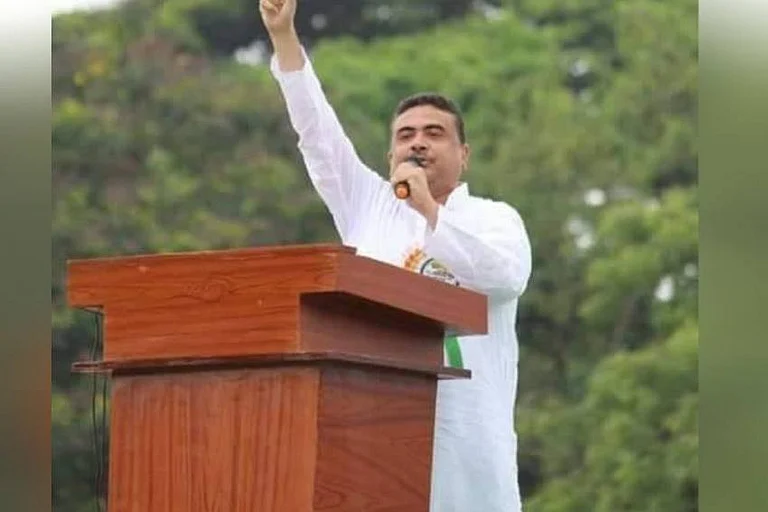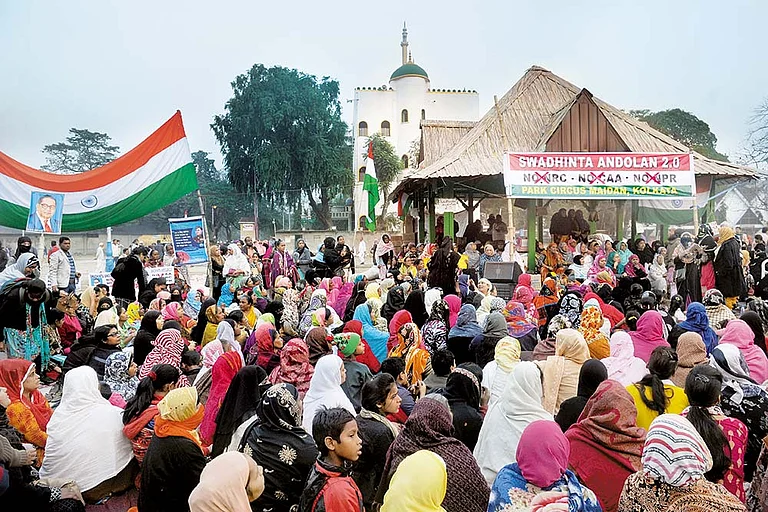In the recently-concluded 2024 Lok Sabha elections, the All-India Trinamool Congress (TMC) bagged 29 seats in West Bengal while their principal opposition party, the Bharatiya Janata Party (BJP), could secure only 12 seats. The Congress could only retain its stronghold of Malda Dakshin.
Muslims play a crucial role in the politics of West Bengal. According to the 2011 Census, Muslims make up around 27 per cent of the population. Muslims hold the key in as many as 72 seats where they constitute more than 35 per cent of the total electorate. The TMC has significantly enjoyed Muslim support in the last two elections. Apparently, in this election, it appears that Muslims are behind the TMC, but some fault lines have been drawn. This could serve as a warning sign for the TMC, while the Left and the Congress could see it as an opportunity to redouble their efforts at the grassroots level.
The result of the assembly constituencies having more than 35 per cent Muslim electorate have been combined together to understand the direction of Muslim voters in West Bengal.
| Muslim Voting Pattern | ||||||
| Party | 2019 | 2021 | 2024 | |||
| Seat Share | Vote Share | Seat Share | Vote Share | Seat Share | Vote Share | |
| AITC | 59 | 47.10% | 70 | 54.10% | 54 | 46.30% |
| BJP | 4 | 26.80% | 2 | 26.90% | 7 | 26.70% |
| LF+INC | 9 | 22.90% | - | 15.20% | 11 | 20.90% |
| Source: ECI, Compiled by self |
From the data presented in the table above, it is clear that the TMC enjoys overwhelming support of the Muslims in the state. In 2021, of these 72 seats, TMC won 70. Therefore, without doing well in this section, it is impossible for the TMC to surpass 200 seats in the state assembly. But what is also visible is that 2024 is the weakest performance of the TMC in this category of seats where Muslims hold the key. Despite having the BJP as the principal opposition, the Muslim support base of the TMC seems to be waning in Bengal, at least in this election.
For a better understanding, these 72 seats can be divided into two groups. In the first group, assembly constituencies falling under the Lok Sabha constituencies, where Muslims are in majority or near to majority, have been included. The rest of the seats have been included in the second group. It has been observed that voting pattern of Muslims varies among these two groups―Muslims vote differently depending upon whether they are in majority or minority. The consolidation seems to be more in seats where they are in minority. Where they are in majority, there is a trend of a split voting. Seats of the first group are located in Central Bengal.
Central Bengal
Of the 72 constituencies, where the Muslim population is above 35 per cent, 35 assembly constituencies fall in Central Bengal. They are under Raiganj, Malda Uttar, Malda Dakshin, Jangipur, Baharampur and Murshidabad Lok Sabha constituencies.
| Muslim Voting Pattern in Central Bengal | ||||||
| Party | 2019 | 2021 | 2024 | |||
| Seat Share | Vote Share | Seat Share | Vote Share | Seat Share | Vote Share | |
| AITC | 22 | 38.90% | 34 | 55.50% | 17 | 37.20% |
| BJP | 4 | 22.60% | 1 | 24.80% | 7 | 25.20% |
| LF+INC | 9 | 34.50% | - | 15.90% | 11 | 33.90% |
| Source: ECI, Compiled by self |
This region was traditionally a stronghold of the Left and the Congress until 2019, when the BJP became the state’s principal opposition party. The Congress used to occupy the anti-Left Front space. Stalwarts like Priya Ranjan Dasmunsi, Ghani Khan Choudhury, Pranab Mukherjee, and Adhir Ranjan Chowdhury have won from this region. The Muslims of this region then voted for the TMC due to strong polarisation, fear of the BJP coming to power, and issues like the National Register of Citizens (NRC) and the Citizenship (Amendment) Act (CAA). For which, the TMC got an overwhelming majority of Muslim votes: 50 per cent in 2016, 70 per cent in 2019, and 75 per cent in 2021, according to the Centre for the Study of Developing Societies (CSDS).
In 2024, the TMC’s support base among the Muslim population in this part of Bengal has eroded considerably, even lower than during the 2019 Lok Sabha elections. Several factors contribute to this decline, including a decrease in political polarisation compared to the NRC/CAA issue, which boosted the TMC support in 2021. However, the most significant factor is the lack of Muslim representation within the TMC government and party structure, leading to a simmering discontent among Muslim voters. Muslim MLAs in the state also dropped from 57 in 2016 to 48 in 2021. This discontent was evident in the by-elections of Ballygunge and Sagardighi, with the Sagardighi by-election instilling confidence among Muslim voters that the TMC is not the only option to defeat the BJP.
The TMC has made a series of strategic mistakes in several Lok Sabha seats. For example, in Raiganj, a constituency with a 45 per cent Muslim population, they fielded a Hindu Marwari candidate (an ex-BJP MLA). This decision proved to be a disadvantage for the TMC, as a Muslim Congress candidate, Ali Imran Ramz, secured 20 per cent of the vote share with a strong lead in several Muslim-majority blocks. In Malda Uttar constituency, dominated by Scheduled Castes, Scheduled Tribes and Muslim voters, Mamata Banerjee's decision to field Prasun Banerjee, a Brahmin ex-IPS officer, resulted in a humiliating defeat. Mostaque Alam, representing the Congress, secured 28 per cent of the vote share, demonstrating the potential for minority mobilisation in favour of opposition candidates. The TMC has won in places where they had fielded strong Muslim faces like Abu Taher Khan in Murshidabad or Khalilur Rahman in the Jangipur constituency.
Rest of Bengal
There are 37 assembly constituencies in this second group of seats, spread across the districts of Cooch Behar, Uttar Dinajpur, Dakshin Dinajpur, Nadia, North 24 Parganas, South 24 Parganas, Kolkata, Howrah and Birbhum.
| Muslim Voting Pattern in Rest of Bengal | ||||||
| Party | 2019 | 2021 | 2024 | |||
| Seat Share | Vote Share | Seat Share | Vote Share | Seat Share | Vote Share | |
| AITC | 37 | 54.90% | 36 | 52.80% | 37 | 54.80% |
| BJP | - | 30.70% | 1 | 28.80% | - | 28.10% |
| LF+INC | - | 11.90% | - | 14.50% | - | 8.90% |
| Source: ECI, Compiled by self |
The situation here is different from Central Bengal. The ruling party, the TMC, continues to enjoy the unquestionable support of the Muslim electorate. The reason behind their numbers is much less than that of Hindus, and they understand the importance of consolidating their votes behind the TMC.
In 2019, the TMC won all 37 seats. However, in 2021, they lost a seat in South 24 Parganas, Bhangore, and a few percentages of vote share with the emergence of the Indian Secular Front (ISF) in the districts of North and South 24 Parganas and Howrah. In 2021, the ISF contested in alliance with the Left. Notably, in the 2024 elections, the ISF came out of the Left and Congress alliance and contested on its own. Therefore, the TMC seems to be gaining in these seats as compared to 2021. But the ISF is not out of contention since it surprised everyone and pushed the Left to the fourth position in Barasat, Basirhat, and Jaynagar Parliamentary constituencies.
Beginning of Identity Politics
In Hindu-dominated seats, Muslims have consolidated behind the TMC, but in seats where Muslims are in majority, they are looking for alternatives. Amongst these six Parliamentary constituencies, where Muslims are in majority or very close to it, there is a clear trend of Muslims voting for Muslim candidates regardless of the party symbol. In seats like Malda Dakshin, Jangipur, or Murshidabad, where both the TMC and the Left-Congress alliance fielded Muslim candidates, Muslims rallied behind the strongest candidate according to their opinion. In Raiganj and Malda Uttar, the Congress fielded Muslim candidates and the TMC put forward Hindu candidates who got rejected by the Muslims. The situation was the opposite in Baharampur, where the TMC’s Muslim candidate, Yusuf Pathan, although an outsider, defeated five-time Congress MP Adhir Ranjan Chowdhury. Therefore, a clear trend has emerged: Muslims care more for representation given to them and are ready to look beyond party lines to achieve it.
(Spandan is a graduate student at NUJS, Kolkata, and Sumanta is pursuing a PhD at the Centre of Social Medicine and Community Health, Jawaharlal Nehru University, New Delhi)






















